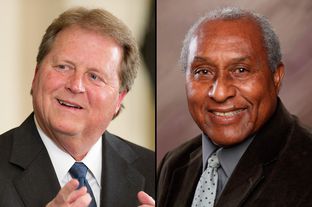Senate Runoff Raises Debate Stakes

Debate prep is futile.
The idea is simple. Put the candidates in front of an audience or on TV, ask them some questions, and let the voters get a reasonable look at who'll go to Washington to bicker on their behalf.
The candidates want a commercial featuring their best aspects and their opponents' worst ones.
The panelists want it to be revealing — especially if that means one of the candidates will make a career move that either propels them into office or expels them into history's bin of asterisks. "Oops." "There you go again." "You're no Jack Kennedy." That sort of thing.
Everybody overthinks it, so what you get are long-winded land-mine questions from the panelists and stock campaign answers from hopeful contestants.
Not making news has become the norm. It's boring, so it's hard to get people to watch. And they don't really have to: If it makes news, it'll appear in other places. If it doesn't, that's an hour that wasn't wasted watching a generic political show. And if it comes back up, the sponsors almost always leave it online, sometimes forever.
Candidates are trained to answer questions in a way that steers the audience away from the questions and back to their answers. You can tell this is about to happen when the answer begins with, "that's a very good question..."
If a candidate wants to talk about border security, questions about immigration policy will end up with answers about border security.
Gov. Ann Richards, frustrated during her 1994 reelection race about George W. Bush's "just four things" message discipline, complained that if you asked him what time it was, "he'd say it was time for tort reform."
Journalists on debate panels know that most politicians get into debates for one of two reasons — either to try to jump their opponent, or to make a necessary public appearance without getting jumped. The U.S. Senate debate on the Republican side originally figured as Ted Cruz, the jumper, and David Dewhurst, the jumpee. Cruz spent the first round of the primary getting Dewhurst, the establishment candidate, out in public for a fight. It didn't work, but now it's a runoff and Dewhurst has to play. He'd like to score some points on Cruz. Jump ball.
On the Democratic side, former state Rep. Paul Sadler, who despite his service is widely unknown to voters, is trying to knock off Grady Yarbrough, who has never held office but who turned out to have the second-favorite name among the unknown Democrats in the May primary. Sadler hopes enough voters see the two of them, and believes that will make the differences obvious. He's the jumper in that one.
The Republicans go on Friday night (6/22) and the Democrats will be taped on Tuesday for broadcast on Wednesday (6/27).

